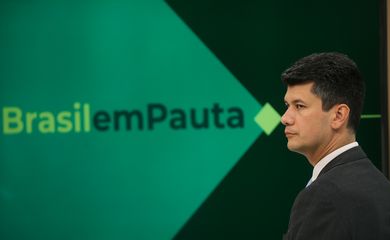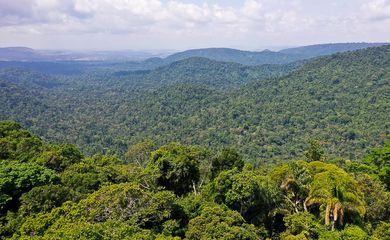BNDES and Incra to implement project on settlements in the Amazon

The presidents of the National Bank for Economic and Social Development (BNDES), Gustavo Montezano, and the National Institute of Colonization and Agrarian Reform (Incra), Geraldo Melo Filho, signed today (7) a cooperation agreement for the implementation of a pilot for the Integrated Project of Territorial Planning (Piot), in settlements in the Amazon region.

During the ceremony, BNDES analyst Luiz Antonio Pazos highlighted that the bank's operations in the Amazon are aimed at maintaining the forest standing, generating sustainable development for the region and transforming the lives of Brazilians who live there.
Territorial planning is one of the axes worked on by the BNDES, said Pazos. Based on this, the institution's team thought of carrying out an integrated project with Incra that “is not just delivering the title (of land title regularization), but that extrapolates this, because that population that is there needs more than the title”.
pillars
Within this scope, the BNDES and Incra partnership established four pillars of action. The first encompasses land tenure regularization, with remote sensing, elaboration of economic and ecological micro-zoning of settlements, possibilities of economic activities and delivery of definitive land titles.
"Family farming. That's what we're talking about”, summarized the BNDES analyst. The second pillar is environmental recovery, with reorientation of land use, encompassing the recovery of degraded areas, which provides for registration in the Rural Environmental Registry (CAR) and protocol and execution of the Project for the Recovery of Degraded and Altered Areas (Prada). “Talking about this is talking about the relationship with the states and the federative pact. That's what we're doing”, said Pazos.
The third pillar refers to the social infrastructure of the settlements, with recovery of local roads, construction of storage sheds, water supply and distribution, rural electrification, education and health facilities.
The fourth and last pillar deals with the productive inclusion of those assisted, to place on the market what they produce, with certification actions in the Ministry, industrialization of production and more efficient technological processes, which will provide the generation of employment and income in the countryside.
Among the benefits announced, emphasis is placed on land title regularization, with a reduction in agrarian conflicts. With the environmental recovery, those assisted will have properties free from embargoes and able to sell to any buyer. According to the BNDES, all this will contribute to restoring the landscape, climate and image of Brazil abroad.
Priority areas
Brazil has a total of 560 Settlement Projects (PAs) that add up to more than 30 thousand families. The BNDES and Incra integrated project will work with two priority areas, where a census and cartographic maps will be carried out, respectively, covering 87 PAs with more than 15 thousand families, or the equivalent of 60 thousand people, located in more than one million hectares, with 38 thousand hectares to be recovered, in the cities of Macapá (AC), Marabá (PA), Porto Velho (RO) and Roraima (RR), totaling a region greater than twice the size of the Federal District. Incra will provide the strategic and technical part and the BNDES will act as an articulator and donor for the project, together with the private sector.
After signing the partnership between public institutions, the goal is to talk about the project with local and state managers and seek support. Afterwards, collective funding will be opened and funding will begin to enable the pilot to be implemented.
The president of Incra, Geraldo Melo Filho, highlighted that the integrated project will rescue farmers assisted by the dignity and production side, uniting the issue of land and environmental regularization with conditions for these people to support their families from the land.
“It is an extremely important and weighty job”. He believes that, with the participation of the BNDES and the engagement of private partners and Incra teams, the project “will help change the way of looking at the way of producing within the settlements of the Amazon as a whole”.
Innovation
The president of the BNDES, Gustavo Montezano, thanked the opportunity to bring the bank to "this unprecedented approach to land and environmental regularization and the productive inclusion of Brazilians who live in the forest."
According to Montezano, Incra's attributes are fundamental for the bank to increase its impact power, just as the BNDES' attributes are fundamental for leveraging the institute's service. “We see this unprecedented project as a pilot to innovate and have experiences”.
The objective is to find a solution and the bank intends to contribute to this, finding an approach that can be spread throughout Brazil. “We are excited, we are motivated, to be able to take the BNDES into the forest and bring here a little financial knowledge and innovation that is going very fast”.
Montezano highlighted that all the technology and valorization of environmental assets is here to stay. "The more financial vehicles to absorb these resources and apply them in a qualified, controlled manner, with good governance and technology, we have a high degree of confidence that they will be required for financial allocations and generate income in a sustainable way."
The Minister of Agriculture, Tereza Cristina, greeted the project participants. "I think you brought us the opportunity to innovate, to do a job that has been our dream since we got here." He added that "we are going to leave here the seed of a planted forest", taking to the small producer who has been in the Amazon for many years, land title regularization, environmental regularization, payment for environmental services, "the much-needed infrastructure". Tereza Cristina also mentioned productive inclusion, which is placing the right project for each community, maximizing earnings and selling correctly.
“Seeing BNDES entering into a subject like this is pleasurable. It's a revolution. Maybe we are here today making history”. The idea, observed the minister, is to make this project between BNDES and Incra a winning project and the first of many that will be able to happen. “And we are going to rescue the image of Brazil and the dignity of small farmers who are in the North of Brazil”.
Text translated using artificial intelligence.





